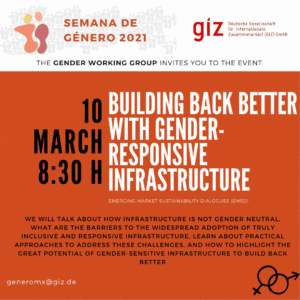Organizers
Emerging Market Sustainability Dialogues (EMSD)
Gender Working Group – GIZ Mexico
Speakers
- Cristina Contreras | Member of Gender and Infrastructure Working Group, Lecturer for Sustainable Infrastructure at Harvard University
- Paramita Datta Dey | Member of Gender and Infrastructure Working Group, City Planner and Urban Development Specialist at the National Institute for Urban Affairs, India
- Mauricio Vázquez Vela | Director at Proyectos México, Mexican Development Bank Banco Nacional de Obras y Servicios Públicos (Banobras)
- Luis Mejía | Chief Sustainability Officer at BlackRock
General purpose
1) Promote the debate on why infrastructure is not gender neutral
2) Outline the barriers that hinder the broad uptake of truly inclusive and responsive infrastructures
3) Share practical approaches to tackle these challenges and
4) Highlight the great potential of Gender-Responsive Infrastructure to build back better.
Context
The outbreak of the COVID-19 pandemic underlined the weaknesses of existing infrastructure systems worldwide: a lack of basic health and sanitation facilities, inadequate transportation and energy networks and insufficient digital infrastructure still affect the well-being of billions of people.
In Mexico, these challenges are exacerbated by the lowest level of infrastructure investment in the whole of Latin America. To tackle this investment gap, the Mexican Development Bank Banobras has identified sustainability as a key aspect to attract investor interest in infrastructure projects. Together with the EMSD project of GIZ and inspired by the Gender Working Group of its Solutions Lab – Scaling for Sustainable Infrastructure, Banobras is now paving the way to foster truly inclusive infrastructure developments – through a gender-responsive approach that leaves no one behind.
Contrary to the flawed yet widespread perception that infrastructure is gender-neutral, women and girls still face a lack of access to basic infrastructure services such as clean water, sanitation or safe public transport. In the long run, all of this undermines their ability to integrate into and benefit from public life in all its social, economic and political aspects. Additionally, intersecting inequalities in education, employment patterns, economic means and social categories such as class or race all influence what services people need as well as their ability to benefit from infrastructures and related economic sectors.
Against this background, taking sustainable infrastructure with a gender-responsive approach in the centre of any recovery process can trigger enormous social and environmental progress in achieving the Sustainable Development Goals (SDGs). What is more, sustainable infrastructure projects also attract investor interest and mobilize private capital – with gender-lens investing as a rapidly growing trend in this.
Más información | More information (GIZ internal link)


